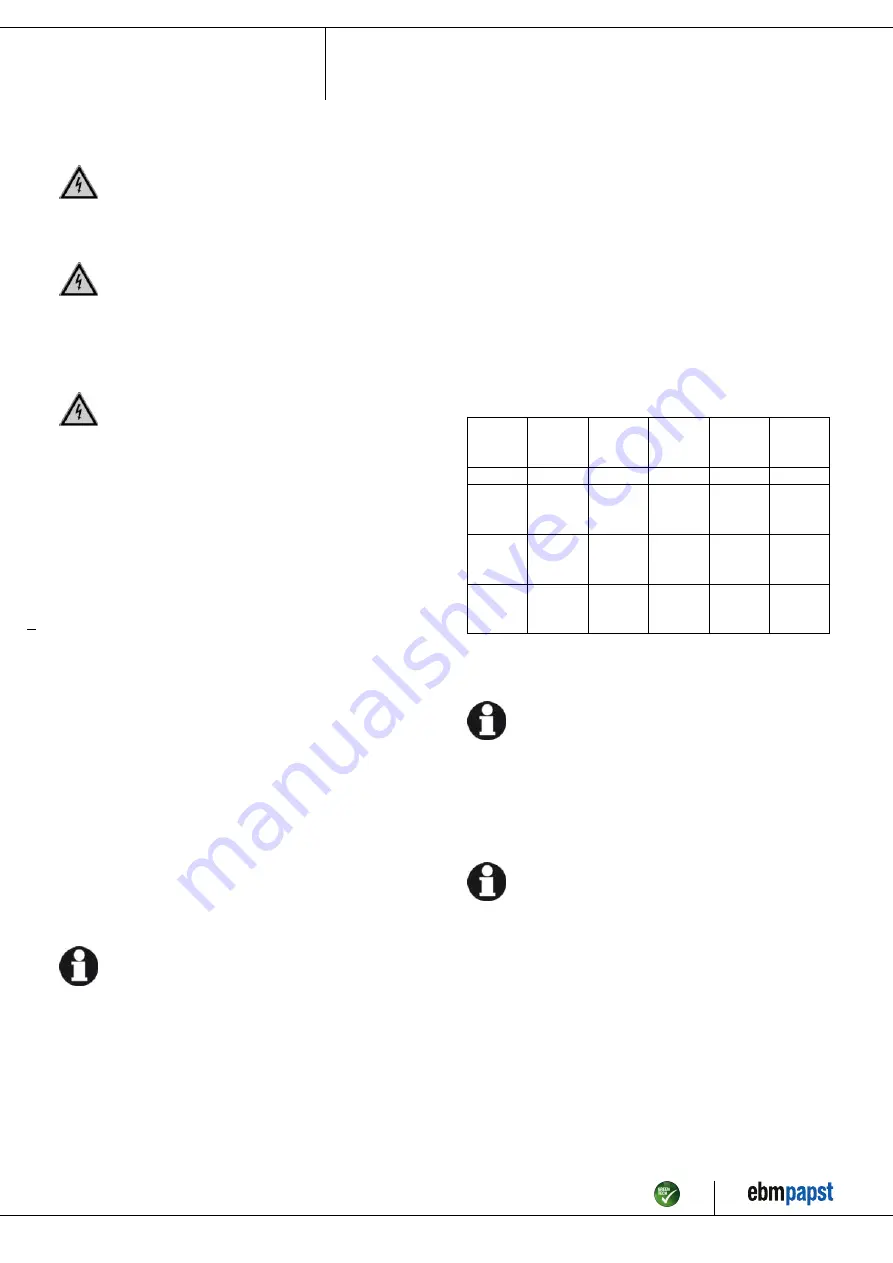
Operating instructions
G3G250-MW50-01
Translation of the original operating instructions
4.2 Connecting the electrical system
DANGER
Electric voltage on the device
Electric shock
→ Always install a protective earth first.
→ Check the protective earth.
DANGER
Incorrect insulation
Risk of fatal injury from electric shock
→ Use only cables that meet the specified installation
requirements for voltage, current, insulation material, load etc.
→ Route cables such that they cannot be touched by any
rotating parts.
DANGER
Electrical load (>50 µC) between mains wire and
protective earth connection after switching of the supply
when switching multiple devices in parallel.
Electric shock, risk of injury
→ Make sure that sufficient protection against accidental contact
is provided.
Before working on the electrical connection, the
connections to the mains supply and PE must be shorted.
CAUTION
Electrical voltage
The device is a built-in component and features no electrically
isolating switch.
→ Connect the device only to circuits that can be switched off
using an all-pole disconnecting switch.
→ When working on the device, you must switch off the
system/machine in which the device is installed and secure
it from being switched on again.
NOTE
Interferences and failures are possible
Maintain a distance to the power supply line when routing the
control lines of the device.
→ Ensure a sufficiently large clearance.
Recommendation: clearance > 10 cm (separate cable
routing)
NOTE
Water penetration into leads or wires
Water enters at the cable end on the customers side and can
damage the device.
→ Make sure that the cable end is connected in a dry
environment.
The control voltage circuit is not electrically isolated. Connect
the device only to circuits that can be switched off using an all-
pole disconnecting switch.
4.2.1 Prerequisites
;
Check that the data on the type plate match the connection data.
;
Before connecting the device, ensure that the supply voltage matches
the operating voltage of the device.
;
Only use cables designed for current according to the type plate.
For determining the cross-section, follow the basic principles in
accordance with EN 61800-5-1. The protective earth must have a
cross-section equal to or greater than the outer conductor cross-
section.
We recommend the use of 105°C cables. Ensure that the minimum
cable cross-section is at least
AWG26/0.13 mm².
4.2.2 Power supply connection, fuse protection
Assignment of conductor cross-sections and the fuse protection required
for them (overload protection only, no device protection).
Nominal
voltage
Safety
fuse
Automatic
circuit
breaker
Wire
cross-
section
Wire
cross-
section
VDE
UL
VDE
mm²
*AWG
3/PE AC
380 - 480
VAC
16 A
15 A
C16A
1.5
16
3/PE AC
380 - 480
VAC
20 A
20 A
C20A
2.5
14
3/PE AC
380 - 480
VAC
25 A
25 A
C25A
4.0
12
* AWG = American Wire Gauge
4.2.3 Idle current
Because of the EMC filter integrated for compliance with EMC
limits (interference emission and interference immunity), idle
currents in the mains cable can be measured even when the
motor is at a standstill and the mains voltage is switched on.
●
The values are typically in the range < 250 mA
●
At the same time, the effective power in this operating state
(operational readiness) is typically < 5 W.
4.2.4 Residual current operated device
If the use of a residual current device (RCD) is required in your
installation, only universal residual current devices (type B or
B+) are permissible. Residual current devices (RCD) cannot
provide personal safety while operating the device, as is also
the case with frequency converters. When the device power
supply is switched on, charging current pulses from the
capacitors in the integrated EMC filter can lead to the instant
triggering of residual current devices. We recommend residual
current circuit breakers (RCCB) with an activation threshold of
300 mA and delayed tripping (super-resistant, characteristic K).
Item no. 50734-5-9970 · ENG · Revision 202174 · Release 2018-12-28 · Page 8 / 15
ebm-papst Mulfingen GmbH & Co. KG · Bachmühle 2 · D-74673 Mulfingen · Phone +49 (0) 7938 81-0 · Fax +49 (0) 7938 81-110 · info1@de.ebmpapst.com · www.ebmpapst.com

































